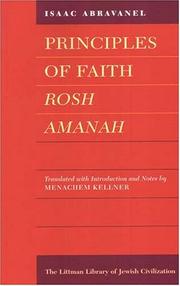
Principles of Faith (Rosh Amanah)
By Isaac Abravanel
Subjects: Faith judaism, Judaism
Description: Don Isaac Abravanel was one of Judaism's greatest thinkers. In his Rosh Amanah (Principles of Faith) Don Isaac Abravanel points out that Hasdai Crescas and his pupil Joseph Albo criticize Maimonides but do not understand him. Their primary complaint is that Maimonides mandates that Jews believe certain dogmas. But, they ask, how can one force another to “believe” anything? Accordingly, Crescas develops a list of six articles of Judaism and Albo three. Abravanel explains that Crescas and Albo overlook two important points. First, Maimonides was not telling the people to believe any particular idea. He knew that people could not be forced to believe anything. He was not speaking about belief, but about knowledge. The word “belief” is not in Maimonides’ formulation in Chelek, although it plays a prominent part in the popular version in the siddur’s Ani Maamin “I believe.” The word used in the formulation in Chelek is ikkarim, “fundamentals.” In Chelek Maimonides tells his readers to study and “understand” the truth about each of the thirteen fundamentals. Second, Abravanel writes, Maimonides is not postulating “true articles of Judaism,” but rather ad hoc “necessary dogmas” that the people needed to help them survive. What are “necessary beliefs”? Did Maimonides Accept All Thirteen Principles? Menachem Kellner, in his The Limits of Orthodox Theology, writes that Don Isaac Abravanel (in his Rosh Amanah) and many others recognize that Maimonides composed his principles for the less educated public to give them information and to strengthen their belief in Judaism. Abravanel faults those who take “Maimonides’ words at face value.” Leo Strauss and Shlomo Pines, Yeshayahu Leibovits and other scholars posit that there is an “exoteric and esoteric Maimonides.” Exoteric statements are ideas that Maimonides writes which he does not view as true but rather as necessary to help the less educated masses, the majority of Jews, because he recognizes that they will feel threatened if they are told their long-held ideas are untrue. The esoteric statements are hints that Maimonides does not state explicitly, but which he expects the learned Jew, who knows both Jewish and non-Jewish studies, to mine from his writings and understand.
Comments
You must log in to leave comments.